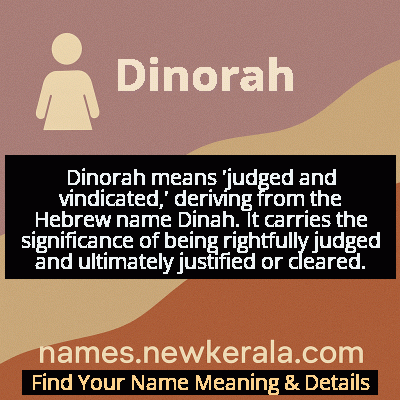Dinorah Name Meaning & Details
Origin, Popularity, Numerology Analysis & Name Meaning of Dinorah
Discover the origin, meaning, and cultural significance of the name DINORAH. Delve into its historical roots and explore the lasting impact it has had on communities and traditions.
Name
Dinorah
Gender
Female
Origin
Hebrew
Lucky Number
6
Meaning of the Name - Dinorah
Dinorah means 'judged and vindicated,' deriving from the Hebrew name Dinah. It carries the significance of being rightfully judged and ultimately justified or cleared.
Dinorah - Complete Numerology Analysis
Your Numerology Number
Based on Pythagorean Numerology System
Ruling Planet
Venus
Positive Nature
Harmonious, responsible, caring, and artistic.
Negative Traits
Overly idealistic, superficial, possessive, or jealous.
Lucky Colours
Pink, turquoise.
Lucky Days
Friday.
Lucky Stones
Diamond, turquoise.
Harmony Numbers
2, 3, 9.
Best Suited Professions
Artists, musicians, teachers, healthcare workers.
What People Like About You
Warmth, nurturing nature, artistic flair.
Famous People Named Dinorah
Dinorah Varsi
Classical Pianist
Renowned Uruguayan pianist known for her interpretations of Romantic repertoire and extensive recording career
Dinorah de Jesús
Actress
Mexican actress known for her roles in telenovelas and films, particularly in Latin American cinema
Dinorah Cantú-Pedraza
Educator and Researcher
Mexican academic specializing in literature and cultural studies, contributing to Latin American educational development
Dinorah C. Brown
Community Leader
Influential African-American community organizer and advocate for social justice and educational equity
Name Variations & International Equivalents
Click on blue names to explore their detailed meanings. Gray names with will be available soon.
Cultural & Historical Significance
In modern times, Dinorah has become particularly popular in Spanish and Portuguese-speaking cultures, where it maintains its Hebrew roots while adapting to Latin linguistic patterns. The name carries with it a sense of biblical heritage combined with feminine strength. In Jewish communities, the name often serves as a connection to ancestral traditions, while in Latin American cultures it represents both religious devotion and cultural identity, frequently chosen by parents seeking a name with deep historical roots and spiritual significance.
The name's journey through different cultures demonstrates how biblical names transform while retaining core meanings. From ancient Hebrew origins to contemporary Latin American usage, Dinorah has maintained its association with judgment and vindication while acquiring additional cultural layers that reflect the communities that embrace it.
Extended Personality Analysis
Women named Dinorah are often perceived as possessing a strong sense of justice and moral clarity, reflecting the name's meaning of 'judgment' and 'vindication.' They tend to be analytical thinkers who carefully weigh decisions and stand firmly for their principles. This inherent sense of fairness often makes them natural mediators in conflicts and trusted advisors among friends and family. Their judgment is typically well-considered rather than impulsive, and they have a knack for seeing multiple perspectives in complex situations.
Beyond their judicial qualities, Dinorahs often exhibit deep loyalty and protective instincts toward loved ones, much like the biblical Dinah's brothers who defended her honor. They combine emotional depth with practical wisdom, creating a personality that is both compassionate and decisive. Many display artistic or creative talents, particularly in fields requiring careful observation and interpretation. Their strength often lies in quiet resilience rather than overt dominance, and they tend to earn respect through consistent integrity and thoughtful action rather than seeking attention or approval.
These personality characteristics create individuals who are both grounded and insightful, capable of navigating complex social situations with grace and determination. The name's biblical heritage seems to imbue its bearers with a sense of purpose and moral responsibility that manifests in their personal and professional lives.
Modern Usage & Popularity
Dinorah maintains moderate but steady usage in contemporary times, particularly within Hispanic and Jewish communities. While it has never reached the popularity charts in English-speaking countries, it enjoys consistent use in Latin America, Spain, and among Sephardic Jewish populations. The name has seen a slight resurgence in recent years as parents seek biblical names with cultural depth that are less common than mainstream choices like Sarah or Rachel. In the United States, it appears most frequently in states with significant Hispanic populations, and its usage reflects a preference for traditional names that honor heritage while providing a distinctive identity. Digital name databases show increasing interest in Dinorah among parents researching meaningful biblical names with strong feminine connotations, suggesting it may experience gradual growth as naming trends continue to favor historically significant and culturally rich options.
Symbolic & Spiritual Meanings
Symbolically, Dinorah represents the concept of righteous judgment and moral vindication. It embodies the idea that truth and justice will ultimately prevail, even after periods of struggle or misunderstanding. The name carries connotations of feminine wisdom and the power of quiet strength—the ability to endure difficulty while maintaining one's integrity. In metaphorical terms, Dinorah suggests a balancing of scales, representing both the process of careful consideration and the eventual restoration of what is right. It symbolizes the journey from being judged to being vindicated, making it a powerful emblem of resilience and moral courage. The name also connects to themes of family loyalty and protection, reflecting the biblical narrative's emphasis on familial bonds and the defense of honor. These symbolic meanings create a rich tapestry of associations that make Dinorah a name representing both personal strength and communal values.

